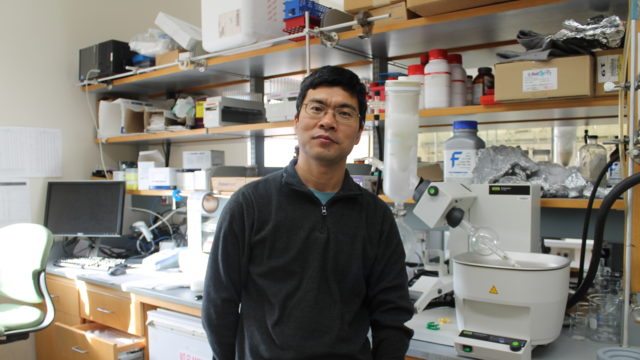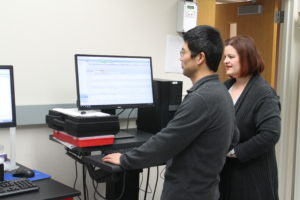
Enhanced analysis of molecular interactions will advance biomedical research and collaborations across UW–Madison campus
By Jill Sakai
With support from a competitive campus grant program, the University of Wisconsin–Madison School of Pharmacy will soon be home to cutting-edge technology to improve the drug discovery and development process.
The project, titled “Accelerating Lead Optimization to Clinical Application Using Microscale Thermophoresis to Quantify Molecular Interactions,” is one of 17 campus projects—out of 111 proposals—funded in Round 4 of the UW2020: WARF Discovery Initiative program. The award will support the purchase of an instrument that uses a micro-temperature gradient for rapid and sensitive analysis of the strength of molecular interactions.
The microscale thermophoresis technology represents a significant improvement over current capabilities on campus, says Weiping Tang, professor in the School of Pharmacy’s Pharmaceutical Sciences Division, director of the School’s Medicinal Chemistry Center, and principal investigator on the award. The machine can assess the interactions between several types of molecules, including proteins, small molecules and nucleic acids, across a wide range of binding affinities.

“We have a number of instruments available on campus, but nothing really comparable to this,” Tang says. He worked with oncology professor Michael Hoffmann to coordinate the project proposal.
Understanding how molecules interact is a key step in numerous biomedical research avenues, from elucidating basic cellular pathways to investigating potential therapeutics for disease. Current methods typically require labor-intensive processing and use larger sample sizes to get an accurate reading. By contrast, the new technology needs only a very small amount of each molecule and minimal sample preparation. And it can run several samples in an hour, compared to other methods that might take hours or even days to complete.
That speed and versatility will substantially accelerate the drug discovery and development process, Tang says. His own research group, Tang Lab, plans to use the machine to optimize synthetic compounds that bind to an enzyme, called ubiquitin ligase, which can control protein stability. They are working to develop small molecules for the treatment of human diseases such as breast cancer.
“Drug discovery and development is a very time-consuming effort. Very often, at the beginning you find a hit and then it takes a lot of time to develop the lead compound,” Tang says. “This new instrument will help us in the optimization process.”
Other collaborators in the School of Pharmacy include:
- Associate Professor Tim Bugni, who studies natural products from marine bacteria as potential therapeutics for infectious diseases. Past methods to characterize small molecule-protein interactions were not well-suited to natural products, he says. The new instrument will enable his group to expand their studies of interactions between natural products and proteins, including a project to understand how natural products inhibit a molecule associated with broad antibacterial resistance.
- Professor Glen Kwon, who studies mechanisms of drug targeting and delivery. One of his projects explores peptide interactions with fibronectin, a protein important in fibrosis and some cancers. The versatility of the microscale thermophoresis machine will facilitate a number of experiments that have not previously been possible, he says. For example, they will be able to probe peptide-protein interactions under a larger range of conditions and with greater timing resolution.
- Assistant Professor Jiaoyang Jiang, who studies the molecular mechanisms and biological functions of protein glycosylation in cancer and other diseases with an aim to discover new drug targets and potential therapeutic compounds. Many of these studies have been challenged by relatively weak binding interactions and a need for large quantities of sample, she says. The microscale thermophoresis instrument will accelerate her group’s ability to explore glycoprotein interactions with other types of molecules.
“This will help us bridge the medicinal chemists here with the biologists on the rest of campus.” –Weiping Tang
The instrument will be housed in the School of Pharmacy’s Medicinal Chemistry Center (MCC), where Tang expects it will foster collaborations among schools and departments across campus. “It’s not just to serve the School of Pharmacy faculty,” he emphasizes. “This will help us bridge the medicinal chemists here with the biologists on the rest of campus.” Already, nearly two dozen research groups from several UW–Madison schools and colleges have signed on to the project as collaborators.
The new capability also will enhance the value of other cross-campus efforts at the MCC, including the creation of a small molecule library supported by a previous UW2020 grant. As campus researchers screen the library for promising tools for their own research, having access to the microscale thermophoresis instrument will allow them to quickly analyze activity of those molecules and optimize compounds for further development, Tang says.
Learn more about the research happening in the School of Pharmacy’s Medicinal Chemistry Center and the Tang Lab.